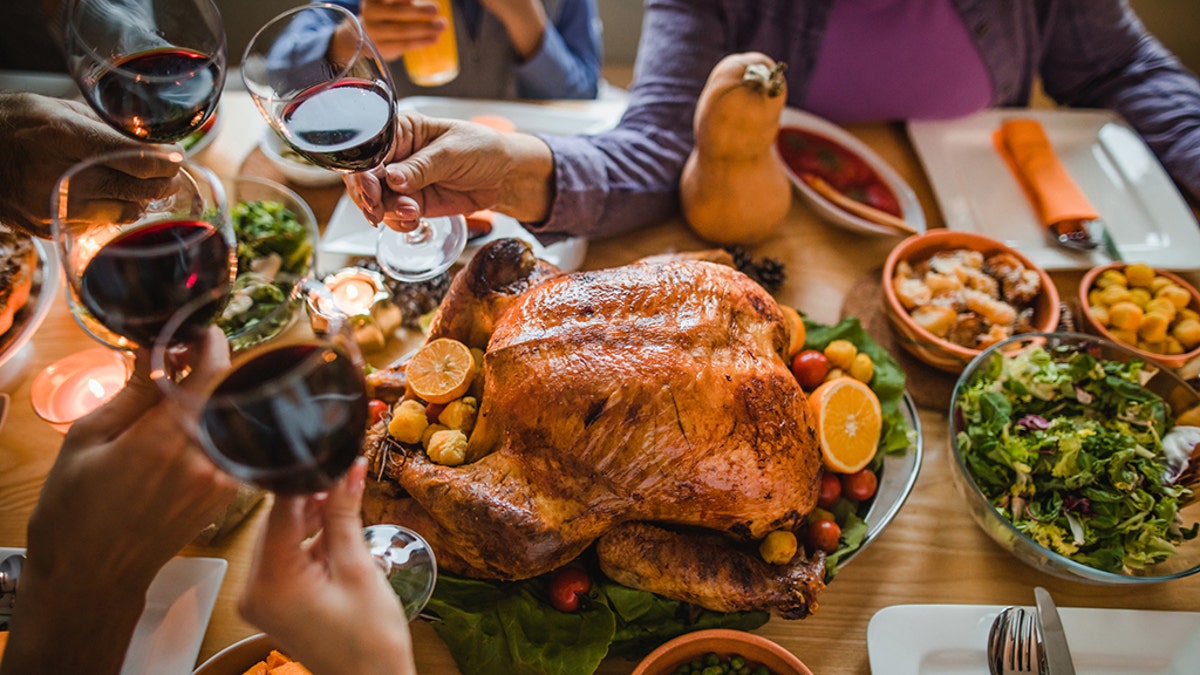
Family feasts are a Thanksgiving tradition -- but watch how much you eat. (iStock)
Many of us will be eating turkey and stuffing on Thanksgiving. But as we enjoy the holiday meal with family and friends, it is important to resist the temptation to stuff ourselves. In fact, overeating can contribute to weight gain and lead to the development of diabetes in the future.
Too many of us feel that Thanksgiving is an exception to the rule of judicious eating. We feel like we have to gobble up every delicious item at the table as part of the celebration of the holiday to show how thankful we are for the feast and how much we appreciate the work of those who prepared every dish.
My concern is that the holidays, beginning with Thanksgiving, may set a bad precedent in terms of eating habits that can then carry over into the new year.
I feel certain that most people will avoid romaine lettuce after the Centers for Disease Control warned Tuesday we should throw it all out after 32 people in 11 states became ill with a dangerous strain of bacteria.
But how many of us will avoid excess alcohol, turkey, stuffing, gravy and desserts? Not enough, I’m afraid.
My vote as a physician is not for austerity, but for portion control. Weight Watchers is right. Small portions – even during a holiday like Thanksgiving – are the way to go, especially considering that November is Diabetes Awareness Month. Overeating contributes directly to the development of Type 2 diabetes.
This is particularly true in developed countries. The United States is No. 43 on a list of 194 countries around the world in terms of diabetes prevalence, with about 10 percent of Americans suffering from the disease.
And if you don’t have diabetes today it may be in your future. The Centers for Disease Control reports that the percentage of adults with diabetes increases as we get older, so that about 25 percent of Americans 65 and older have diabetes.
But this isn’t the whole story. Whereas 30.3 million people in the U.S. have diabetes, an additional 84.1 million people age 18 and over have pre-diabetes, meaning that they are on the road to developing the disease. That amounts to about 34 percent of the adult U.S. population.
This group can go either way. Diet and exercise may help, with weight loss frequently decreasing the risk of diabetes developing in at-risk patients.
Why are overweight people more likely to get diabetes?
Whereas 30.3 million people in the U.S. have diabetes, an additional 84.1 million people age 18 and over have pre-diabetes, meaning that they are on the road to developing the disease. That amounts to about 34 percent of the adult U.S. population.
When you are overweight – as two-thirds of Americans are – you are forcing your pancreas to work overtime to produce more and more insulin. You are born with a set number of insulin receptors, and as you gain weight, these receptors must service more and more surface area to store the sugar-containing foods you put into your mouth.
Also, as you gain more weight you tend to pick up more inflammatory chemicals, creating more resistance to the insulin your body makes.
Translation: overeating leads to weight gain and can lead to sugar building up in your blood, which can lead to diabetes if you are genetically disposed to it.
And diabetes puts a tremendous burden on people with the disease, affecting every organ in your body. It can damage the retina of the eye, the kidneys and the nervous system. Diabetes impacts the heart and leads to a dramatic increase in heart attacks and strokes.
The American Diabetes Association reports that the total estimated costs of medical care and lost productivity for people in the U.S. diagnosed with diabetes in 2017 was $327 billion.
“People with diagnosed diabetes incur average medical expenditures of $16,752 per year, of which about $9,601 is attributed to diabetes” according to the association. “People with diagnosed diabetes, on average, have medical expenditures approximately 2.3 times higher than what expenditures would be in the absence of diabetes.”
Don’t get me wrong, not everyone can avoid diabetes, and there are millions of thin people who suffer from it. But for the rest of us, a Thanksgiving with a big focus on the salad (without romaine) and veggies as part of the meal is the way to go.
Of course, have your turkey and cranberry sauce and pumpkin pie, but avoid second helpings. I would also prescribe cardiovascular exercise (running, biking, or other vigorous activity) in the morning before your gathering, and a long walk afterward. Drink more water than wine.
Be on the lookout for the symptoms of diabetes including increased thirst, frequent urination, tingling, blurry vision, fatigue, weight loss or weight gain.
There are many ways to give thanks for our freedom, our prosperity, our loved ones and all the other blessings of life in America. Sharing great food and drink is only one of them.
I recommend focusing on sharing good will and love with family and friends more than sharing cookies and cake. If you are already overweight, don’t fall off the dietary wagon for even one glorious holiday. In this country, it’s particularly difficult to climb back on.








































